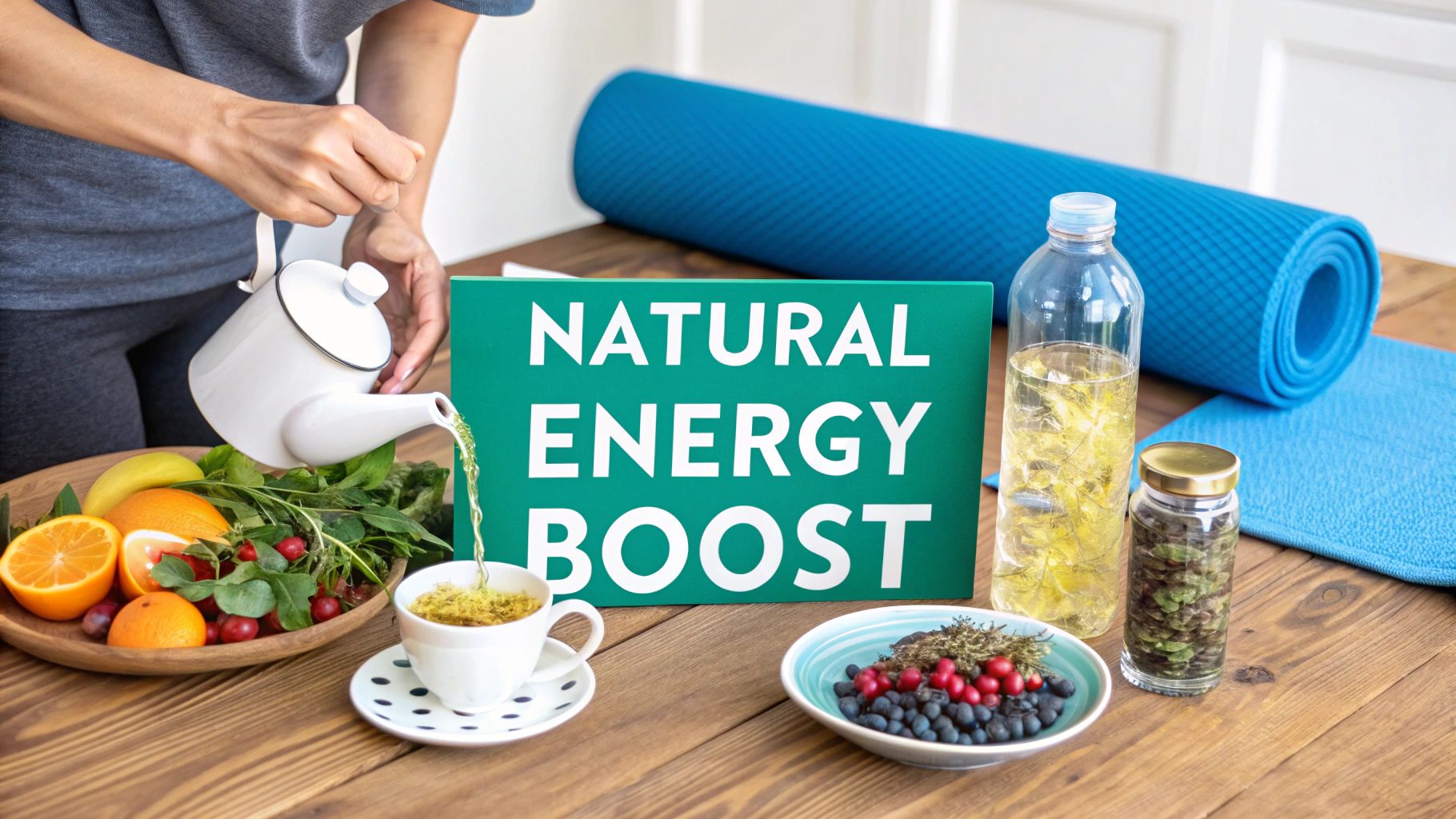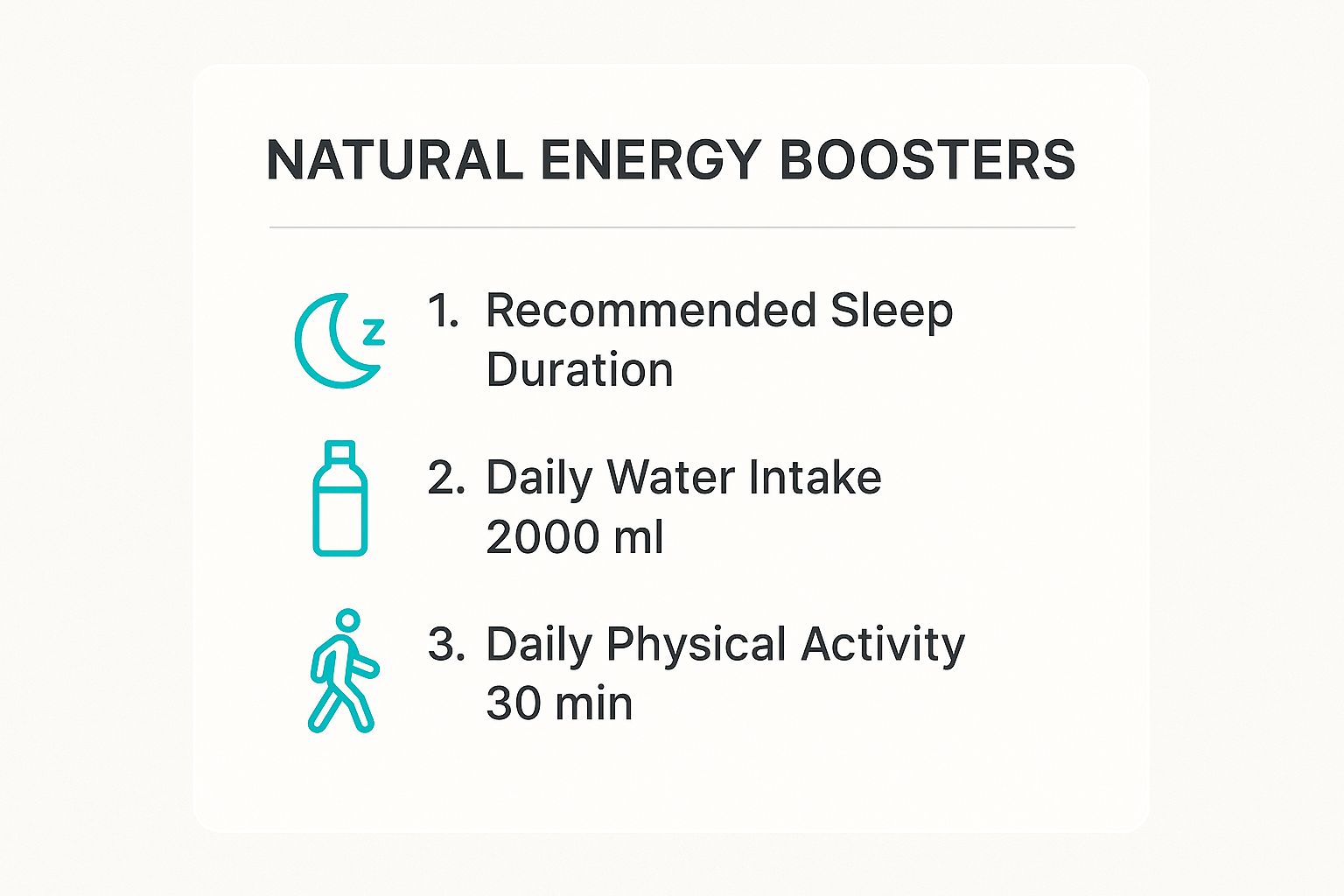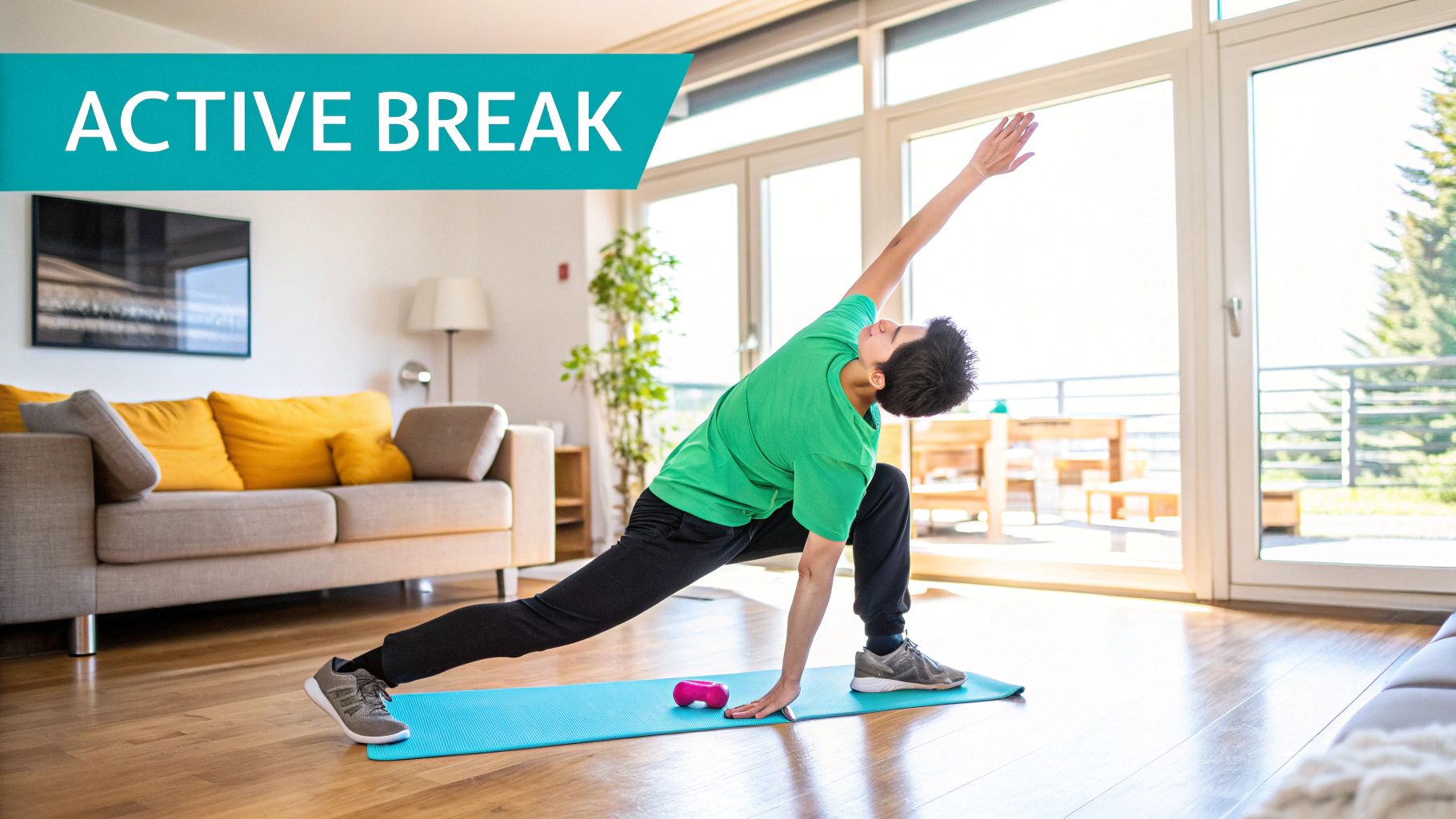

· By Annemarie
How to Boost Energy Naturally: Simple Tips for Lasting Vitality
If you're constantly feeling drained, you're not just imagining it. And no, reaching for another cup of coffee isn't the long-term answer. The real secret to all-day energy isn't about quick fixes; it's about building a solid foundation from the ground up.
Let's cut through the noise and focus on three key areas that deliver the biggest bang for your buck: smart eating, consistent hydration, and quality sleep. We're not talking about complicated routines or fad diets. This is about making small, intentional shifts that fuel your body and mind the way they're supposed to be fueled.
Fuel Your Body Intelligently
What you put on your plate is the cornerstone of your energy levels. It’s pretty simple: sugary snacks and processed junk will send your blood sugar on a rollercoaster, leading to a nasty crash that leaves you more tired than before.
The fix? Prioritize foods that give you a steady, slow release of fuel. This is where things like complex carbs (think sweet potatoes) and quality proteins (like eggs and yogurt) come in. The fiber in the carbs slows down digestion for sustained energy, while the protein provides the amino acids your body needs for metabolic function and muscle repair. It’s a powerful one-two punch.
The goal isn't just to eat but to fuel. Swapping out convenient but empty calories for whole, unprocessed foods is the single most effective dietary change you can make for your vitality.
This visual guide breaks down the simple, daily habits that form the bedrock of natural energy production.

As you can see, it really boils down to three powerful habits: getting enough sleep, staying hydrated, and moving your body every day. Master these, and you'll be well on your way.
Prioritize Rest and Hydration
Sleep is non-negotiable. It’s when your body and brain go into repair mode, recharging for the next day. If you’re constantly running on a sleep deficit, you’ll feel it. In fact, poor sleep can completely cancel out the benefits of a perfect diet.
Creating a consistent sleep schedule—even on weekends—and a relaxing bedtime routine are your first steps. If you’re one of those people who still wakes up feeling like a zombie, you might want to check out our guide on how to get energy in the morning.
Finally, let's talk about the unsung hero of energy: water. It's so easy to forget, but even mild dehydration can trigger brain fog and fatigue. My best advice? Keep a water bottle glued to your hand and sip throughout the day. It’s a simple habit that makes a world of difference in maintaining your mental and physical edge.
Quick-Start Guide to Natural Energy
Feeling overwhelmed? Don't be. Here’s a simple table breaking down the most impactful habits you can start today.
| Habit | Why It Works | Simple First Step |
|---|---|---|
| Eat Protein at Breakfast | Stabilizes blood sugar, preventing the mid-morning crash. | Swap your pastry for two eggs or a Greek yogurt. |
| Hydrate First Thing | Rehydrates your body after sleep and kickstarts your metabolism. | Drink a full glass of water before your coffee. |
| Aim for 7-9 Hours of Sleep | Allows your brain and body to fully repair and consolidate memories. | Set a bedtime alarm on your phone for 30 minutes before you want to be asleep. |
| Take a 10-Minute Walk | Boosts circulation and oxygen flow to the brain, clearing fog. | Step outside for a quick walk around the block after lunch. |
Focus on incorporating just one of these changes this week. Once it feels like a habit, add another. Small, consistent steps are what build lasting energy.
Eating For Energy Beyond The Basics
 To get that real, sustained energy, you have to look past just "eating healthy." It’s all about eating strategically. The food on your plate is either building you up with reliable, steady fuel or setting you up for a massive energy crash later.
To get that real, sustained energy, you have to look past just "eating healthy." It’s all about eating strategically. The food on your plate is either building you up with reliable, steady fuel or setting you up for a massive energy crash later.
The secret is focusing on low-glycemic foods. These are the foods that release sugar into your bloodstream slowly, which helps you dodge the sharp spikes and awful slumps you get from sugary drinks and refined carbs. It’s like choosing a slow-burning log for a fire instead of a piece of paper that just flares up and dies out.
When you eat this way, you're giving your body a consistent energy supply, which means you can actually power through your day without desperately needing that 3 p.m. coffee.
Your Macronutrient Blueprint For Energy
Getting a handle on what each macronutrient does is the key to building meals that actually keep you going. Think of them as a team, where each player has a specific role in your body's energy production.
- Complex Carbohydrates: These are your body's number one fuel source. Foods like whole grains (think oats and quinoa), legumes (beans and lentils), and starchy veggies (like sweet potatoes) are loaded with fiber. That fiber slows down digestion, ensuring a steady trickle of glucose for power that lasts.
- Lean Protein: Protein is your repair crew. It helps rebuild cells and muscle, which fires up your overall metabolism. Grabbing sources like chicken, fish, eggs, or tofu also slows down how quickly you absorb carbs, keeping you feeling full and your energy levels nice and stable.
- Healthy Fats: Don't be afraid of fats! The healthy kinds you find in avocados, nuts, seeds, and olive oil are critical for hormone production and absorbing certain vitamins. They provide a dense, long-lasting energy source that also supports brain health.
A huge mistake I see people make is eating "naked" carbs—like a plain bagel or a handful of crackers by themselves. Always, always pair them with some protein or fat. Add avocado to your toast or grab a handful of nuts with your apple. It makes all the difference for stabilizing your blood sugar.
Pinpointing Key Energy Micronutrients
If macronutrients are the fuel, then micronutrients are the spark plugs. You can have a "healthy" diet on paper, but if you're low on certain vitamins and minerals, your energy levels will be completely sabotaged.
Here are three of the most important micronutrients for energy:
- Iron: This is non-negotiable for creating hemoglobin, the protein in red blood cells that ferries oxygen around your body. Low iron means less oxygen, which leads directly to that deep, dragging fatigue. You can find it in lean red meat, spinach, lentils, and fortified cereals.
- Magnesium: This mineral is a true workhorse, involved in over 300 different processes in your body, including converting food into ATP—your cells' energy currency. Almonds, spinach, black beans, and avocados are packed with it.
- B Vitamins: The B-vitamin family, especially B12, is famous for its role in energy metabolism. These guys help your body turn the food you eat into energy it can actually use. Load up on whole grains, meat, eggs, and dark leafy greens.
Eating smart also counts when you’re out with friends. Making sure you've had a balanced, nutrient-rich meal can completely change how you feel during and after a night of drinking. If you need some ideas, check out our guide on what to eat before drinking alcohol for some great food choices.
It sounds completely backward, I know, but it’s one of the most reliable truths I’ve learned about the human body: you have to spend energy to make more energy.
When you’re totally exhausted, the absolute last thing you feel like doing is getting up and moving. But trust me, making that small initial investment in physical activity pays off with a massive return in sustained vitality. It's a game-changer.
Think of your body like a power grid. When demand is low because you're sitting around, the grid scales back production. But when demand suddenly spikes—say, you start moving—the grid doesn't just keep up; it starts building new power plants to handle the increased load. This is exactly what’s happening inside your cells.
The Science: Why Moving Gives You More Juice
Every single cell in your body is packed with tiny power plants called mitochondria. Their whole job is to take the food you eat and the oxygen you breathe and turn them into adenosine triphosphate (ATP). ATP is basically the chemical currency that fuels everything you do, from blinking to running a marathon.
When you start exercising regularly, you’re sending a clear signal to your body: "Hey, I need more power over here!" In response, your body doesn't just make the existing mitochondria work harder. It actually builds more of them.
More mitochondria mean you have a higher capacity for producing energy. This translates to feeling more energetic all day long, not just when you’re working out. It’s one of the most effective ways to naturally boost your energy levels.
On top of that, movement releases mood-boosting brain chemicals like dopamine and serotonin, which helps fight off that mental fog and fatigue. It doesn’t take much, either. Research shows that just 20 minutes of low-to-moderate activity three times a week can create a noticeable lift in your energy. If you want to get nerdy with the science, Harvard Health has a great explanation of how exercise fuels your cells.
The key takeaway is this: consistent movement turns your body into a more efficient energy-producing machine. You're not just burning calories; you're upgrading your entire system for better performance.
How to Actually Put This Into Practice
You don't need a pricey gym membership or to punish yourself with hour-long sweat sessions to feel the benefits. The real secret is consistency, not intensity. The goal is to weave movement into your daily life until it feels as natural as brushing your teeth.
Here are a few practical ways to get started that I’ve seen work for almost everyone:
- The 20-Minute Walk: It's the gold standard for a reason. It’s low-impact, clears your head, gets your blood flowing, and you don’t need any special gear. Try slotting it in during your lunch break or right after work to decompress from the day.
- "Exercise Snacking": Can't find a solid 20-minute block of time? No problem. Break it up. Do 10 minutes of bodyweight squats and push-ups in the morning. Take a brisk 10-minute walk in the afternoon. These little "snacks" of movement really do add up.
- Strength Training: Building a little muscle is a fantastic way to increase your resting metabolism, meaning you burn more energy even when you’re just sitting on the couch. Just two 30-minute sessions a week using dumbbells, resistance bands, or your own body weight is a great place to start.
Start small. Seriously. If you’re coming from a mostly sedentary lifestyle, even a 10-minute daily walk is a huge win. That initial push might feel tough, but I promise, within a week or two, you'll start to notice you have more energy, not less.
Mastering the Art of Restorative Sleep

We've all been there. You clock a solid eight hours in bed, but you wake up feeling groggy and completely drained. If this sounds familiar, it’s a massive sign that something is off with your sleep quality. The real secret to boosting your energy often has less to do with how long you sleep and everything to do with how well you sleep.
It all comes down to something called sleep architecture. Think of it like a construction project for your brain and body. To feel truly rested, your brain has to cycle through several distinct stages—light, deep, and REM sleep. These cycles are non-negotiable for repairing tissues, locking in memories, and keeping your hormones in check.
When this crucial cycle gets interrupted, even for a few seconds at a time, you get cheated out of the most restorative phases. This is exactly why you can sleep for nine hours straight and still feel like you’ve been hit by a truck. The goal isn't just to get more sleep; it's to create an environment where your body can do its essential overnight work without being disturbed.
Creating Your Personal Sleep Sanctuary
Your bedroom should be more than just a place to crash. It needs to be a sanctuary engineered for deep, uninterrupted rest. It’s wild how many of us overlook simple things in our environment that are actively sabotaging our sleep night after night.
A few small tweaks can make a world of difference in protecting those precious sleep cycles.
- Cool It Down: Your body temperature naturally needs to drop to fall asleep and stay asleep. The sweet spot is surprisingly cool, somewhere between 60-67°F (15-19°C). If your room is too warm, you'll likely find yourself waking up more often.
- Embrace the Darkness: Seriously, even a tiny bit of light from your phone charger or a streetlamp can mess with melatonin, the hormone that tells your body it's nighttime. Blackout curtains are a great investment, and you should cover up or remove any glowing electronics.
- Establish a Wind-Down Routine: You can't just flip a switch on your brain and expect it to power down instantly. Give yourself an hour before bed to transition. Dim the lights, put away all screens, and do something genuinely calming. Think reading a physical book, some gentle stretching, or listening to quiet music. It’s like sending a memo to your brain that shutdown is approaching.
My personal game-changer was a strict "no phone in the bedroom" rule. It felt super weird at first, but it forced me to disconnect and pick up a book instead. Within a week, I was falling asleep way faster and waking up feeling noticeably better.
Navigating Sleep-Wrecking Culprits
What you eat and drink in the hours leading up to bedtime can completely derail all your efforts. The two biggest offenders? Caffeine and alcohol. Both are notorious for fragmenting your sleep architecture, even if you don't realize it.
Caffeine has a half-life of about five to six hours. This means that 2 p.m. coffee is still lingering in your system and disrupting your deep sleep stages well into the night. My personal cutoff is 2 p.m., sharp.
Alcohol is even sneakier. Sure, a glass of wine might make you feel drowsy and help you nod off, but it wreaks havoc on your REM sleep later in the night. That's the main reason you often wake up feeling exhausted and mentally foggy after a few drinks, even if you slept the whole night through. Being mindful of your intake, especially close to bedtime, is critical if you want to wake up feeling genuinely refreshed.
Tackling the Silent Energy Drain of Stress

Ever feel completely exhausted for no good reason? There’s a good chance chronic stress is the culprit. Think of it as a silent energy thief that keeps your body stuck in a low-grade "fight or flight" mode, constantly sipping from your energy reserves until you’re left running on fumes.
This whole process is driven by cortisol, your main stress hormone. When cortisol levels stay high, they mess with everything from your sleep and mood to how your body actually uses energy. It’s that awful “wired but tired” feeling—a frustrating state of total exhaustion.
The good news? You can absolutely fight back. Learning to consciously calm your nervous system is one of the most powerful skills you can develop to reclaim your energy. It's how you tell your body it’s safe to power down and stop burning through its precious resources.
Mindfulness Tools You Can Use Anywhere
You don’t need to book an hour-long meditation class to find your calm. A few simple, practical mindfulness tools can break the stress cycle in just a couple of minutes, no matter where you are.
One of the best is box breathing. It’s incredibly simple and works by directly influencing your vagus nerve, which helps dial down your body's stress response.
- Inhale: Slowly breathe in through your nose for a count of four.
- Hold: Gently hold that breath for another four-count.
- Exhale: Slowly breathe out through your mouth for four.
- Hold: Hold your breath again for a final count of four.
Just repeat this cycle four or five times. Take a second to notice how your body feels afterward. It’s a subtle but powerful reset you can pull out at your desk, stuck in traffic, or right before a tough conversation.
Another quick-hitter is the 5-4-3-2-1 grounding technique. This is perfect for pulling yourself out of anxious thought loops and back into the present moment. Just pause and identify: five things you can see, four things you can feel, three things you can hear, two things you can smell, and one thing you can taste.
Stress management is an active practice, not a passive wish. By consciously shifting your focus, you're retraining your nervous system to exit its high-alert status, which is fundamental to preserving your natural energy.
Building a Stress-Resilient Lifestyle
While those in-the-moment techniques are clutch, the real long-term win is building a lifestyle that's naturally resistant to stress. This means setting boundaries and intentionally adding activities that fill your cup back up.
For example, just spending time in nature has been shown to lower cortisol levels significantly. A simple 20-minute walk in a park can have a measurable impact. In the same way, getting back into hobbies—things you do just for fun, with zero goals attached—is a powerful antidote to burnout. It reminds your brain that life isn't just one long to-do list.
It's also worth recognizing how we sometimes use things like alcohol to manage stress, a strategy that can seriously backfire and make fatigue even worse. For those nights out, knowing how to prep your body can make a huge difference the next day. We’ve got some great advice in our guide on how to avoid a hangover after drinking with top tips to try. When you protect your system, you’re also protecting your energy.
Frequently Asked Questions About Natural Energy
Even when you're all in on making changes, a few questions always seem to pop up. When it comes to boosting your energy the natural way, knowing what to expect can make all the difference. Let’s clear up some of the most common questions I hear.
How Long Until I Actually Feel More Energetic?
This is the big one, isn't it? You're putting in the work and you want to know when you'll start feeling that payoff. It’s a totally fair question.
While some people feel a little lift within just a few days of cleaning up their diet, the real, noticeable change for most of us takes about two to four weeks of consistent effort. Think of it as your body recalibrating. It needs that time to adjust to better fuel, repair itself on a cellular level, and find its new, higher-energy rhythm.
Just remember, consistency trumps perfection every time. One less-than-ideal meal or a skipped workout won't derail you. The key is just to get right back on track with your next decision.
The goal here isn't a quick, fleeting fix. It's about building a solid foundation for energy that actually lasts. Be patient with your body through this process—the sustained vitality you're building is worth the wait.
Are Energy Drinks A Good Quick Fix?
We've all been there. That afternoon slump hits, and the siren song of a brightly colored can is hard to ignore. But are they a smart move for sustainable energy? Honestly, no.
Most of those drinks give you a jolt from a one-two punch of sugar and caffeine. It works for a minute, sure, but it almost always leads to a nasty crash later, leaving you even more drained than before. You're basically just borrowing energy from your future self, with interest.
Now, specific supplements like iron or B vitamins can be game-changers if you have a real deficiency. But they’re a targeted solution, not a substitute for the fundamentals. It’s always best to build your energy from the ground up with good food, sleep, and movement.
What Is Better For Energy: Long Or Short Workouts?
Great question. The answer is that both are fantastic, but they play different roles on your team. You can think of them as different tools in your energy-boosting toolkit.
- Longer Workouts (30-45 minutes): These are your foundation-builders. They're amazing for improving your mood, beefing up your long-term mitochondrial function (your body's power plants), and building solid cardiovascular endurance.
- "Exercise Snacks" (10-15 minutes): These short bursts of activity—like a quick, brisk walk or a few sets of squats—are perfect for an immediate pick-me-up. They fight off midday fatigue, get blood flowing to your brain, and break up the monotony of sitting, all without a huge time commitment.
Your best bet? Use a mix of both. Try to schedule a few longer sessions each week, then sprinkle in those shorter exercise snacks whenever you feel your energy start to dip.
Will I Feel More Tired When I Start Exercising?
It definitely sounds backward, but yes, it’s totally possible to feel more tired when you first start. This is especially true if you’re coming from a pretty sedentary lifestyle. But please, don't let it discourage you!
What you're feeling is your body adapting. You're waking up muscles and a cardiovascular system that have been on a long nap. That initial feeling of fatigue is just a sign that change is happening.
The key is to ease into it. Start with low-intensity stuff you actually enjoy, like walking or cycling. I promise, within a couple of weeks, you'll hit a tipping point. That’s when exercise starts to generate more energy than it takes, and you’ll really feel your body getting stronger and more efficient.
Ready to enjoy your celebrations without sacrificing the next day’s energy? Upside makes it easy. Our science-backed jelly sticks help you feel great, so you can live your social life to the fullest and still wake up refreshed. Learn more and grab yours at https://enjoyupside.com.
